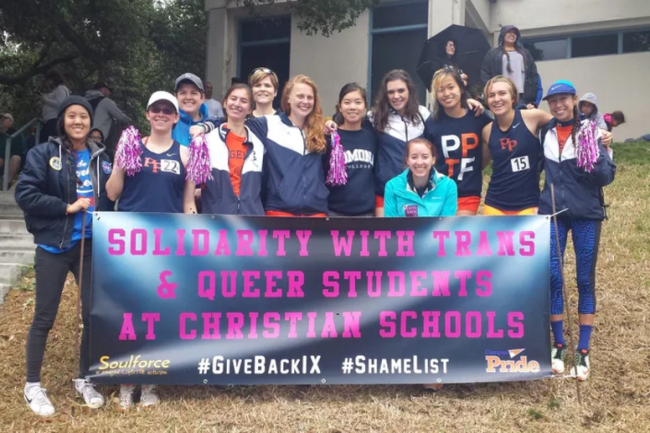You have /5 articles left.
Sign up for a free account or log in.

Athletes protest Title IX waivers at the Pomona-Pitzer Track and Field Invitational.
Soulforce/Campus Pride
Last year, the National Collegiate Athletic Association condemned a controversial Indiana law that gave businesses the right to refuse service to lesbian, gay, bisexual and transgender people. The association, which is headquartered in Indianapolis, then joined a coalition of Indiana businesses aiming to add LGBT civil rights protections to state law.
In March, NCAA officials made similar statements -- though critics say the support came too late -- after other new laws in Houston and North Carolina permitted discrimination against LGBT citizens. “I think the membership is inching toward a more proactive stand on this issue,” Harris Pastides, chair of the NCAA’s Division I board of directors and president of the University of South Carolina, said during a news conference ahead of the men’s basketball Final Four.
Mark Emmert, the NCAA’s president, said that the association would consider no longer hosting playoffs in states with such laws, adding that the issue is “simply far too important to all of our member schools.”
But, as a growing number of religious NCAA institutions request and receive waivers allowing them to discriminate against LGBT athletes, in particular transgender students, advocates are asking why the NCAA hasn’t taken such a proactive stance with its own membership.
“These requests are directly in conflict with the NCAA’s longstanding commitment to diversity and inclusion of all people regardless of sexual orientation and gender identity,” Campus Pride and Soulforce wrote in a letter signed by 80 other LGBT rights groups last month. “The Title IX waiver allows campus administrators to deny transgender students admission, usage of public accommodations and protections against anti-LGBTQ actions from students and faculty -- all based on a student’s gender identity.”
The letter asked the NCAA to “divest from all religious-based campuses who have requested these discriminatory waivers.”
In 2014, many advocates for gay and transgender students were surprised to learn that the Education Department had granted to a number of colleges exemptions from parts of Title IX of the Education Amendments of 1972 that, in theory, bar discrimination in areas such as housing, admissions and educational opportunities.
Title IX requires colleges and universities to provide equal opportunities in athletics to male and female students and to take steps to prevent and punish sexual assaults. But the law also covers other forms of discrimination, and the Education Department has said that it protects transgender students.
Title IX has a specific exemption for religious colleges, however, if they can prove that the law requires them to violate their religious beliefs. The waivers vary by institution, but most allow exemptions for admissions, housing, athletics, rules of behavior and employment. Some also include exemptions related to counseling and financial assistance.
At least 58 institutions have now requested or received a waiver. Nearly half of them are members of the NCAA.
Those who have received the waivers tend to be smaller Division II or Division III colleges, but LGBT rights groups have similar concerns about some religious institutions with big-time college sports programs, as well. Baylor University -- a Baptist institution with powerhouse Division I football and basketball teams -- specifically banned "homosexual acts" until last year, comparing the behavior to sexual assault and incest. Brigham Young University, a Mormon institution in Division I, still bans "all forms of physical intimacy that give expression to homosexual feelings."
The NCAA has boycotted institutions before over ideological differences. In 2005, the NCAA threatened to bar about 20 colleges from hosting postseason games over their use of “hostile” Native American mascots. Many of the teams changed their names or received waivers after getting support from the tribes they were named after. Institutions in South Carolina and Mississippi were banned from hosting most championship games because the states they were located in still flew the Confederate flag over their statehouses. South Carolina’s ban was lifted after it removed the flag last year.
The NCAA also temporarily boycotts members for breaking the association’s rules or failing to meet its academic requirements.
In recent years, some NCAA members and conference leaders attempted to ban for-profit institutions from the association. A compromise was reached in 2014, allowing for-profit colleges to remain in the association but barring them from having any formal say in the creation of NCAA rules and regulations. Though NCAA officials stated that the move was an attempt to preserve the association’s nonprofit status, some members were vocal that their support of the change was actually because of ideological differences.
“It was about if we want to have any of them in the divisions, competing against nonprofits and advertising that in their athletic schedules, further legitimizing what they see as their role in the education continuum,” Edward Ray, president of Oregon State University, said at the time.
The NCAA could vote to pass a rule barring institutions from discriminating against LGBT students, and that could include institutions that receive Title IX waivers, said Marc Edelman, an associate law professor at the City University of New York and an expert on sports and antitrust law. But institutions affected by the ban could also sue the association, arguing that it violates the Sherman Antitrust Act -- the federal law that prohibits business activities deemed anticompetitive.
“The NCAA could absolutely vote to pass such a rule, but the rule would certainly be subject to challenge,” Edelman said. “One could make a very reasonable argument under antitrust law that banning any members is an illegal restraint of trade. At the same time, despite very real antitrust concerns, there is an extensive history of NCAA members nevertheless engaging in such boycotts.”
For now, at least, the NCAA does not plan on taking the risk.
In a response to Campus Pride’s letter, Bernard Franklin, the NCAA’s chief inclusion officer and its vice president of education and community engagement, said that while it is “committed to supporting a student-athlete experience that prioritizes student health, safety and well-being," and offers several resources promoting inclusion of LGBT athletes, it also aims to preserve “individual institutional values.”
"In doing so, the landscape of higher education offers students the opportunity to select from schools that value various attributes," Franklin wrote. "While it is not our role to tell schools whom they should admit, the goal of higher education is to promote students making a decision based on their ability to evaluate multiple schools to find one that best meets their needs to be successful."
Gail Dent, associate director of public and media relations at the NCAA, reiterated last week that the association “values diversity and inclusion and its importance in education,” noting that the NCAA does not have a role in interpreting and enforcing Title IX. The NCAA took a stronger stance on Indiana’s Religious Freedom Restoration Act last year, Dent said, because the association’s national office -- with more than 500 employees -- is housed in the state’s capital and was directly affected by the law.
In a statement, Shane Windmeyer, executive director of Campus Pride, and Havin Herrin, executive director of Soulforce, said they were “deeply disappointed” by the NCAA’s “lack of leadership” on the issue.
The two groups are “continuing to work with the NCAA on other initiatives to further this along,” Windmeyer said this week. They have also organized demonstrations to protest the institutions that received Title IX waivers, including at the Pomona-Pitzer Track and Field Invitational earlier this month in Southern California, where 10 of the 47 teams competing had Title IX exemptions or antigay policies.
"It is hypocritical for the NCAA to criticize the state of North Carolina or any other place about LGBTQ discrimination when the organization itself perpetuates discrimination within its own membership and will not hold its member organizations accountable for Title IX exemptions which harm LGBTQ youth," Windmeyer said. "The NCAA has a long road of work ahead to catch up its membership to the words and statements they espouse on paper as far as diversity and inclusion."




